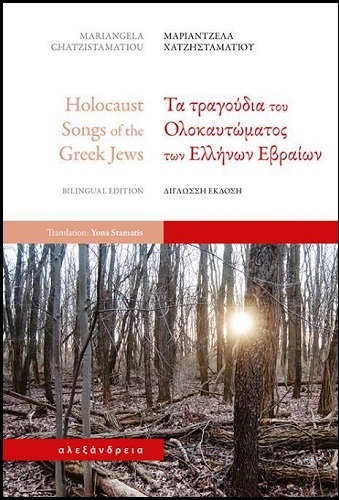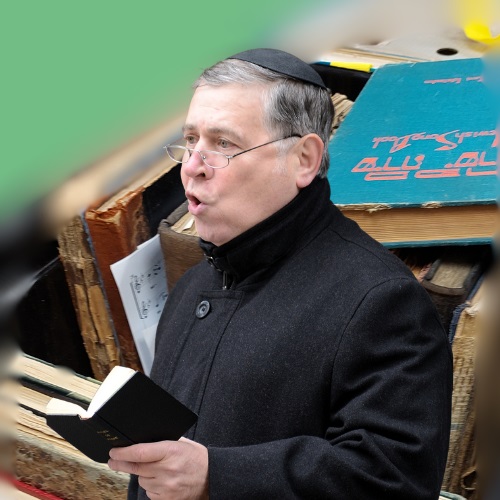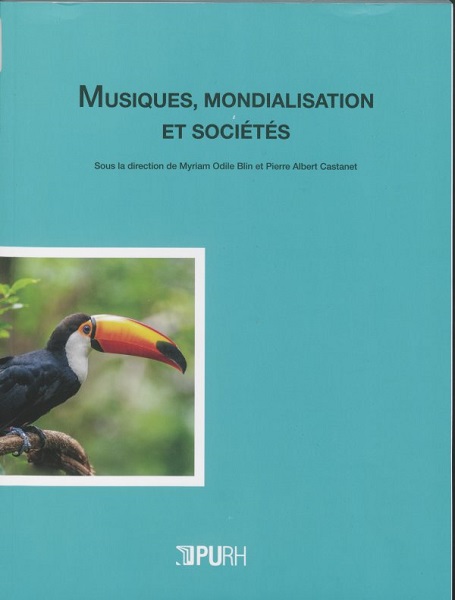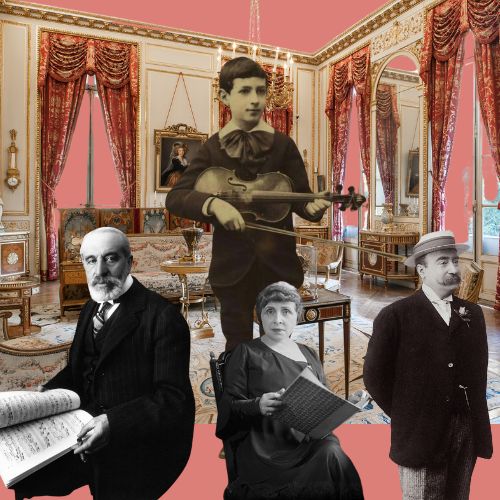
By Hervé Roten
Between 1870 and 1940, musical life in France depended largely on the support of a few enlightened, music-loving patrons. Among these patrons were a significant number of Jews.
Princess Edmond de Polignac (1865-1942), née Winaretta Singer, daughter of Isaac Singer, the inventor of the perfected sewing machine, opened a salon in 1887, attracting numerous composers and musicians. Married for the second time to Prince Edmond de Polignac, from the winter of 1893-1894 she organized musical gatherings in her hotel on avenue Henri-Martin, attracting numerous writers and musicians, including Marcel Proust, Jean Cocteau, Colette, Diaghilev, Manuel de Falla, Chabrier, d’Indy, Fauré, Nadia Boulanger, Arthur Rubinstein, Wladimir Horowitz and Clara Haskil. A confirmed painter and musician, the Princesse de Polignac benefited from the enlightened advice of Gabriel Astruc, Serge de Diaghilev and Nadia Boulanger. Between 1912 and 1940, she commissioned some twenty scores from seventeen French and foreign composers, including Igor Stravinsky (Renard), Erik Satie (Socrate), Darius Milhaud (Les Malheurs d’Orphée) and Francis Poulenc (Concerto pour deux pianos and Concerto pour orgue).
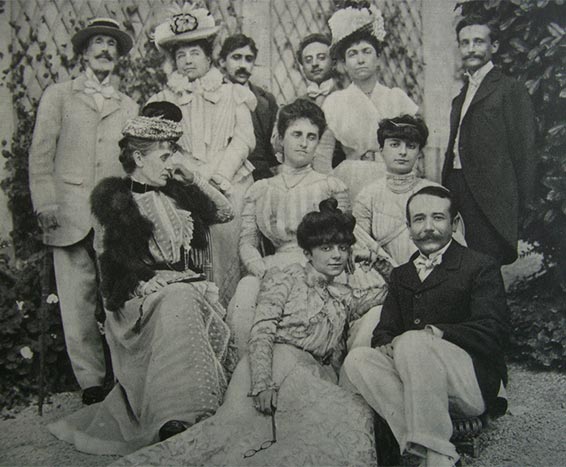
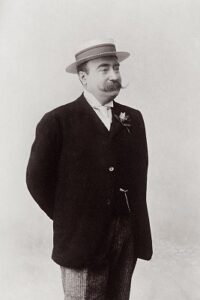
A patron of the arts, Baroness Edouard de Rothschild (1884-1975), née Germaine Halphen, hosted a number of musicians at her hotel at 2 rue Saint-Florentin, including Alfred Cortot, Jasha Heifetz, Yehudi Menuhin, Vladimir Horowitz and Arthur Rubinstein, with whom she was very close.
Born into a wealthy family from Constantinople, Count Isaac de Camondo (1851-1911) was an enlightened amateur musician. He was the composer of some twenty vocal, instrumental and orchestral works. A generous patron of the arts, he was one of the main shareholders of the Théâtre des Champs-Élysées, alongside Baron Henri de Rothschild, the Rothschild brothers, Émile and Fernand Halphen, Madame Louis Stern, the Cahens d’Anvers, Henry Deutsch de la Meurthe, Albert Kahn, Willy Blumenthal, Paul Fould and Louis Barthou.
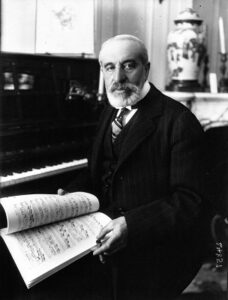
Like Isaac de Camondo, the industrialist Henry Deutsch de la Meurthe (1846-1919) was known for his philanthropy and his taste for music. He was one of the largest shareholders of the Opéra, for which he composed Icare, a lyrical epic in three tableaux by Henri Cain, orchestrated by Camille Erlanger, and was also the author of numerous melodies.
However, the receptions organized by personalities from the world of finance, particularly in the salons of the Jewish bourgeoisie, had nothing to envy those of the nobility. Maurice Ephrussi (1849-1916) and his wife, née Rothschild, entertained at their hotel at 19 avenue du Bois-de-Boulogne. They called on Gabriel Astruc to compose their program and hire artists. Maurice’s elder brother, Michel Ephrussi and his wife ran a salon near the Étoile at 48 rue de la Pérouse. Madame Michel Ephrussi, a fine pianist, enjoyed playing in the company of artists and composers such as Georges Enesco.
The Stern family came from Frankfurt. Edgar Stern, married to Marguerite Fould, entertained at his hotel at 20 avenue Montaigne. The Sterns also hired Gabriel Astruc to organize their musical receptions, sometimes accompanied by ballets.
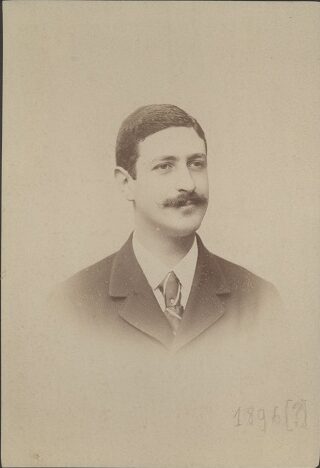
Born into a family of wealthy Jewish financiers, Albert Cahen d’Anvers (1846-1903), a student of César Frank, organized musical sessions at his hotel in the Faubourg Saint-Germain from 1870, hosting Jules Massenet and Vincent d’Indy, among others. Attracted to music, Fernand Halphen (1872-1917), whose mother belonged to the Ephrussi, Stern, and Rothschild families, entered the Paris Conservatory at the age of thirteen. His parents, Georges and Henriette Halphen, were patrons of the arts and entertained guests at their Paris hotel at 24 rue Chaptal and at their home in the Monastère de Ville-d’Avray. Fernand Halphen also ran a salon where his works were performed. After his tragic death during World War I, his widow, Alice Koenigswarter, continued to organize concerts in her Paris salon on rue Dumont d’Urville and at La Chapelle-en-Serval. During the interwar period, she welcomed Robert and Gaby Casadesus, André Jolivet, Darius Milhaud and Francis Poulenc, among others.
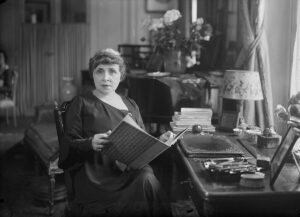
Many amateur musicians also host a salon. For some, especially women who compensate for the frustration of not being able to perform on public stages, it’s the only way to express their talent and be heard by an audience, sometimes even alongside professional musicians. Madame Maurice Sulzbach, née Frincsel, ran a prestigious salon at 52 bis avenue d’Iéna and at her castle in Le Chesnay (Seine-et-Oise), which was regularly visited by Vincent d’Indy, Camille Erlanger and Ernest Chausson. Louise Crémieux (1863-1925), granddaughter of Adolphe Crémieux, was an amateur singer and ran a salon where she entertained Fauré, Roger-Ducasse and Ravel, to whom she dedicated L’Heure espagnole and Le Noël des jouets. Before becoming the wife of Claude Debussy in 1904, Emma Bardac (1862-1934), née Moyse, married Sigismond Bardac, a Jewish banker and collector of German origin, in 1879. The couple settled in Paris and opened a salon where, in the last years of the 19th century, Fauré introduced the best members of his composition class: Koechlin, Ducasse and Ravel.
The musical tradition seems to have been equally strong in the families of Isabel Lang (1904-1988) and Henry Gouïn (1900-1977), who married in 1931 at the Abbaye de Royaumont, which belonged to the Gouïn family. They hosted many musicians, performers and composers, including Albert Roussel, Darius and Madeleine Milhaud, Roland Manuel, Jacques Ibert, Florent Schmitt, Alexandre Tansman, Luigi Dallapiccola and Ernst Krenek. As a forerunner of corporate patronage, Henry Gouïn is said to have tried to persuade industrialists to support artists around 1937. However, the tax system was not adapted at the time and his project was never realized. Fifty years later, this measure was introduced by the French Ministry of Culture.
What would musical life have been like at the turn of the 20th century without the contribution of patrons and musical salons? Many of these salons were run by prominent members of the Israeli bourgeoisie who, by supporting musical creation, enabled France, and Paris in particular, to exert a real artistic influence in Europe and the world.
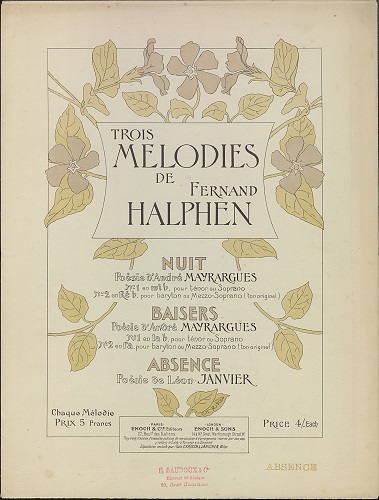
Nuit, Baisers, Absence
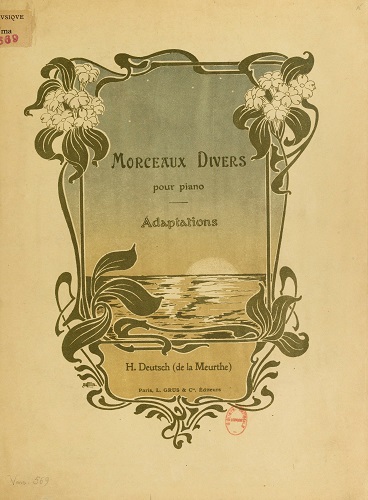
arrangement by H. Deutsch (de la Meurthe)
°°°°°°°°°°°°°°°°°°°°°°°°°°°°°°°°°°°°
Sources: This article, part of which appeared in 2006 in the booklet of the double CD Fernand Halphen – Melodies, Pieces for Piano and Chamber Music, owes much to the remarkable book by Myriam Chimènes, Mécènes et musiciens – Du salon au concert à Paris sous la IIIe République, Paris, Fayard, 2004, 792 pp.
